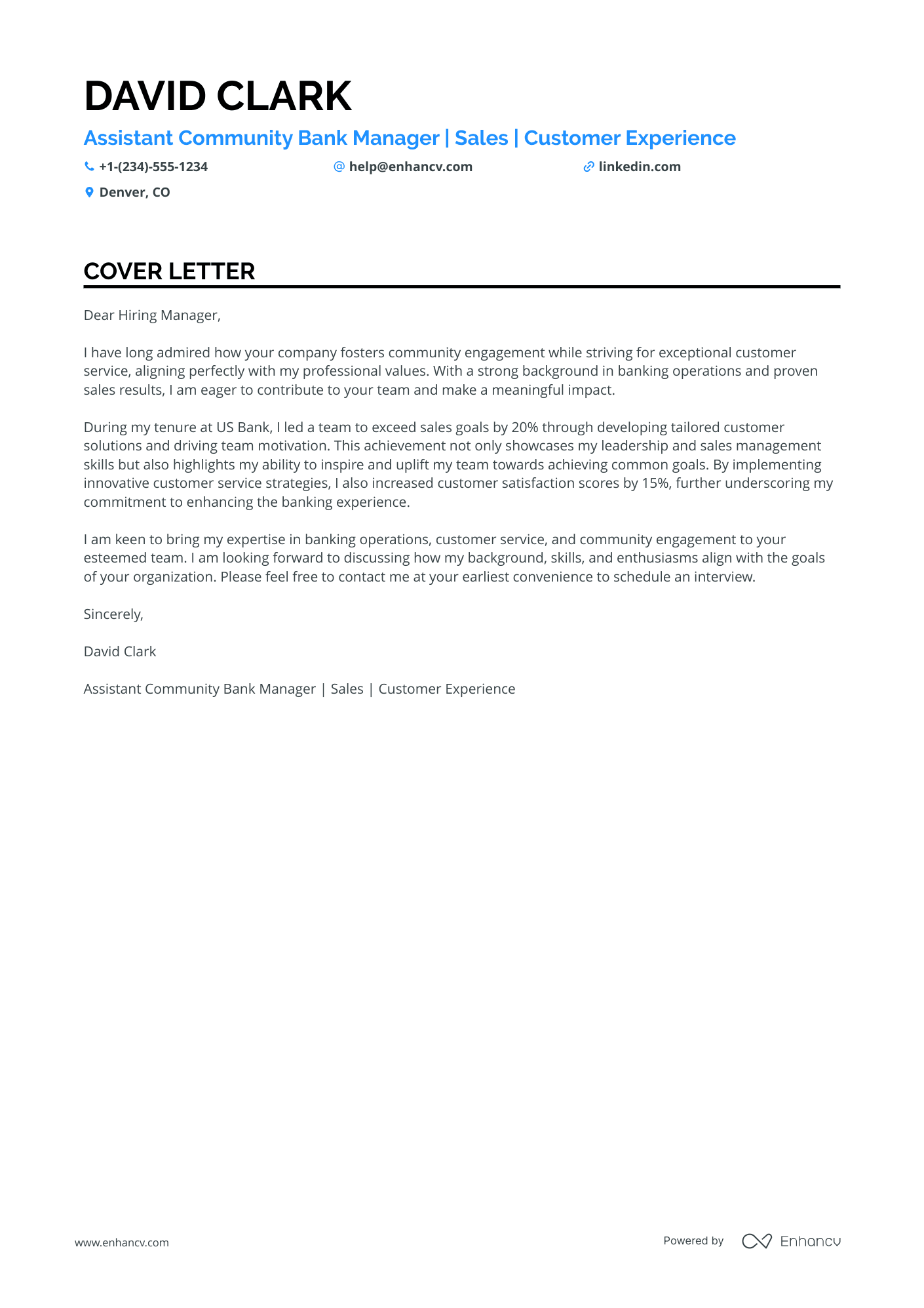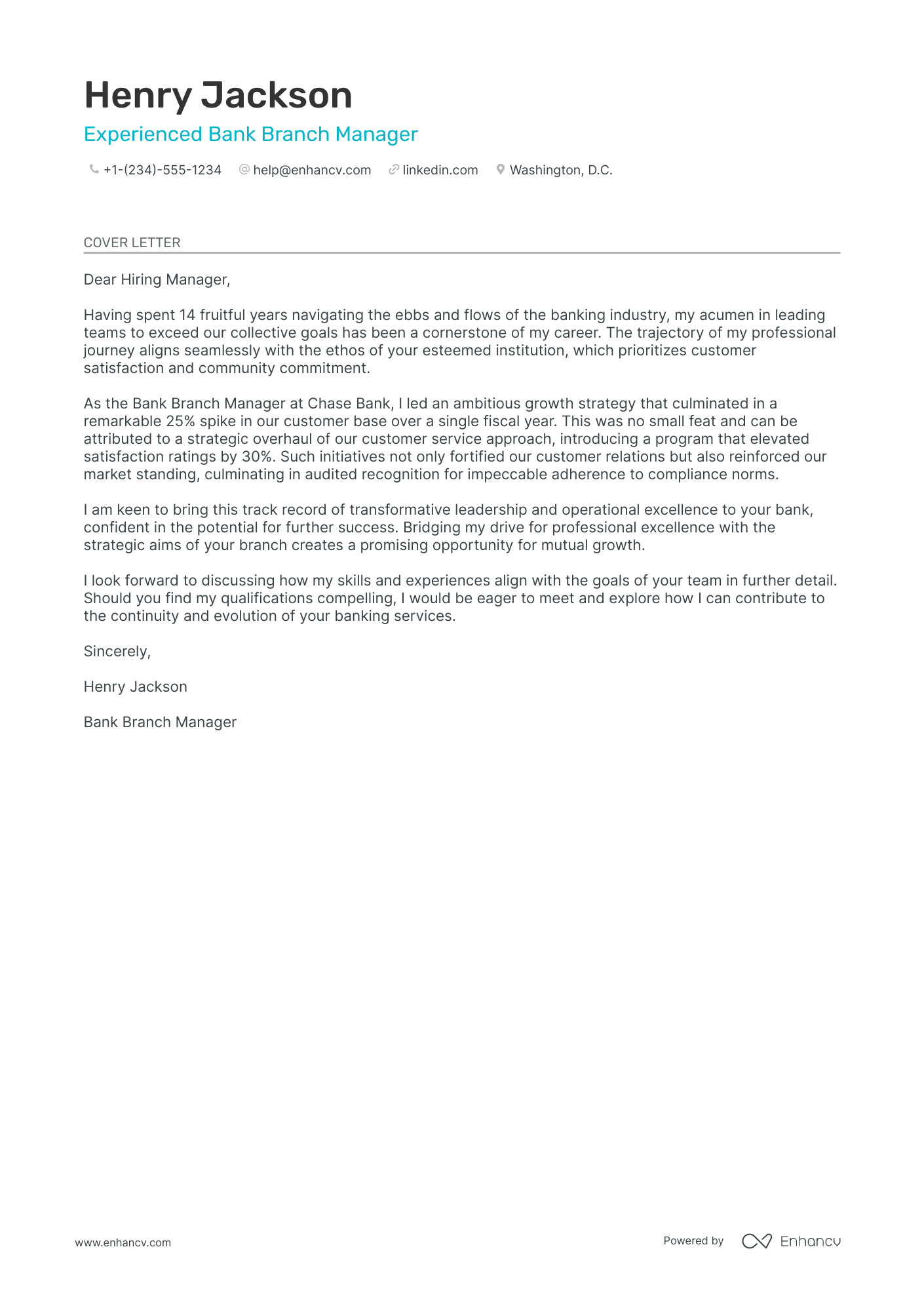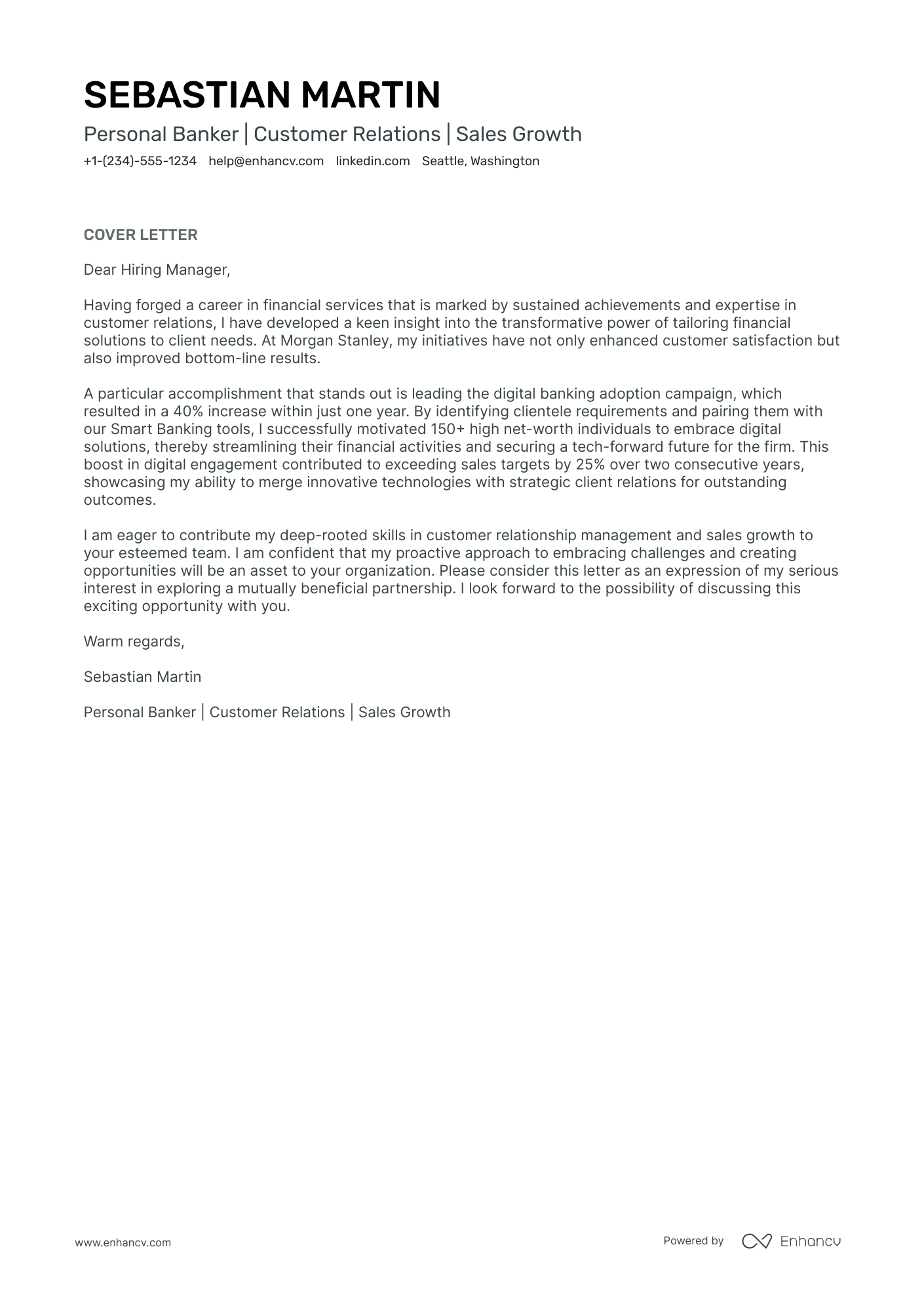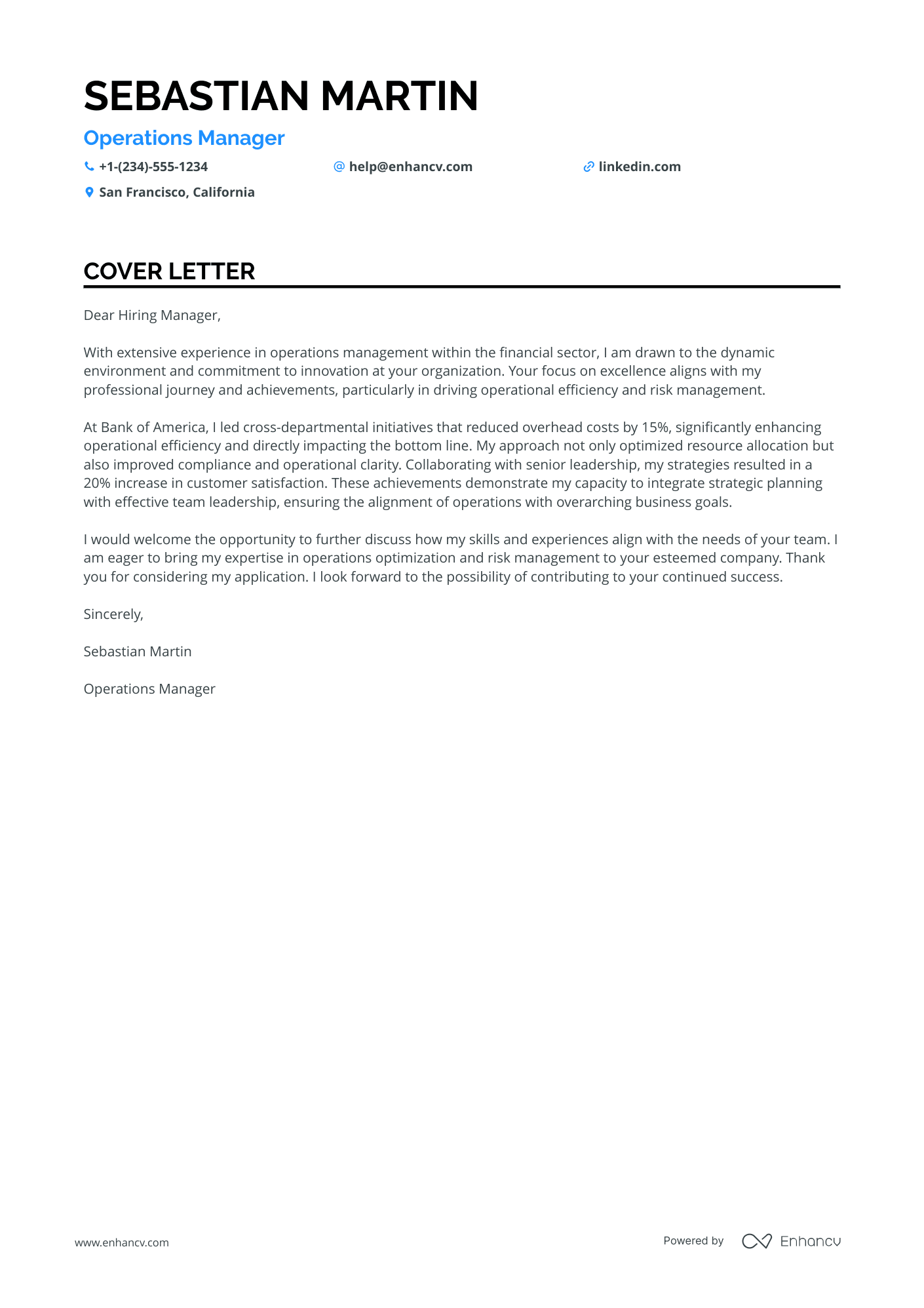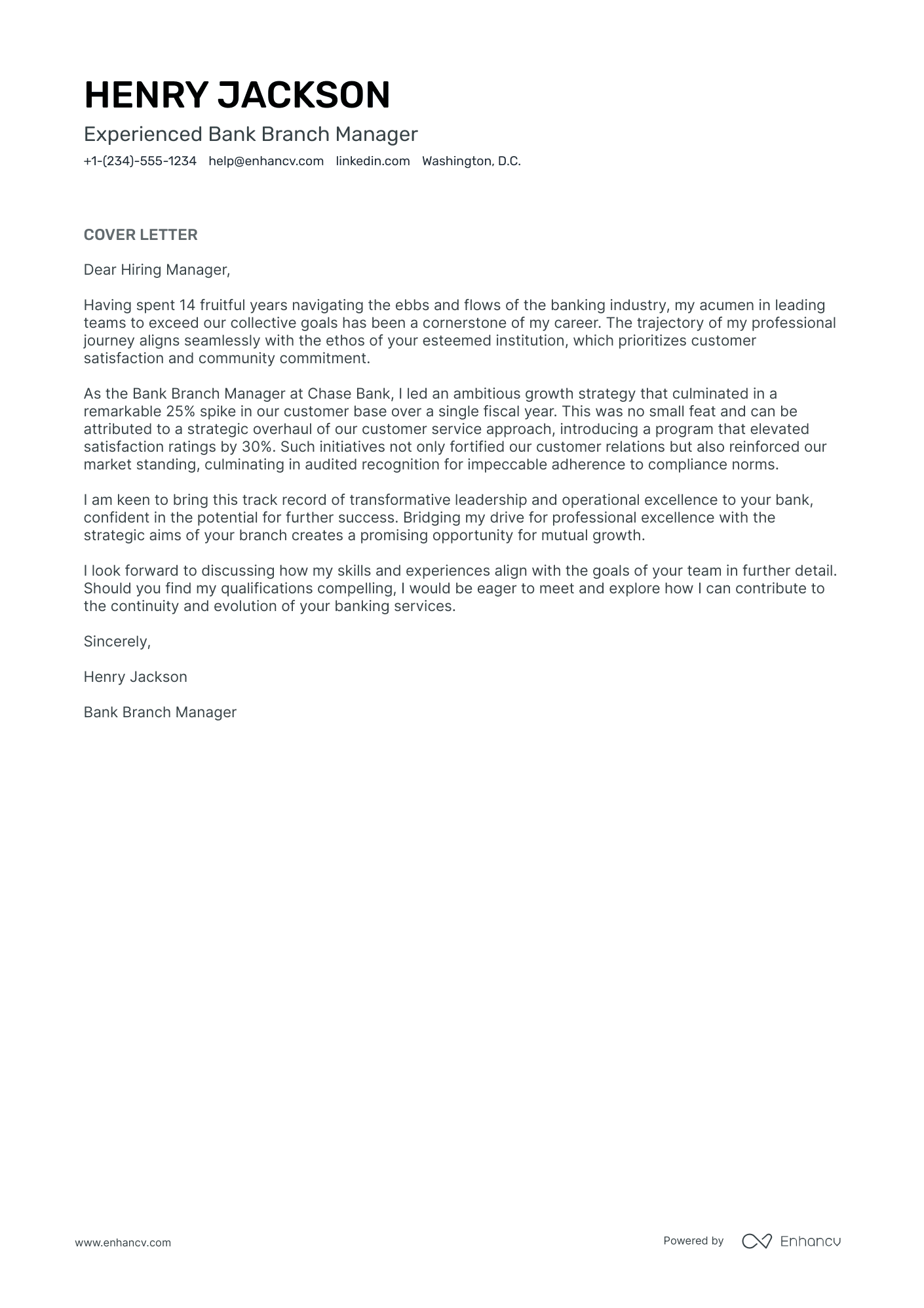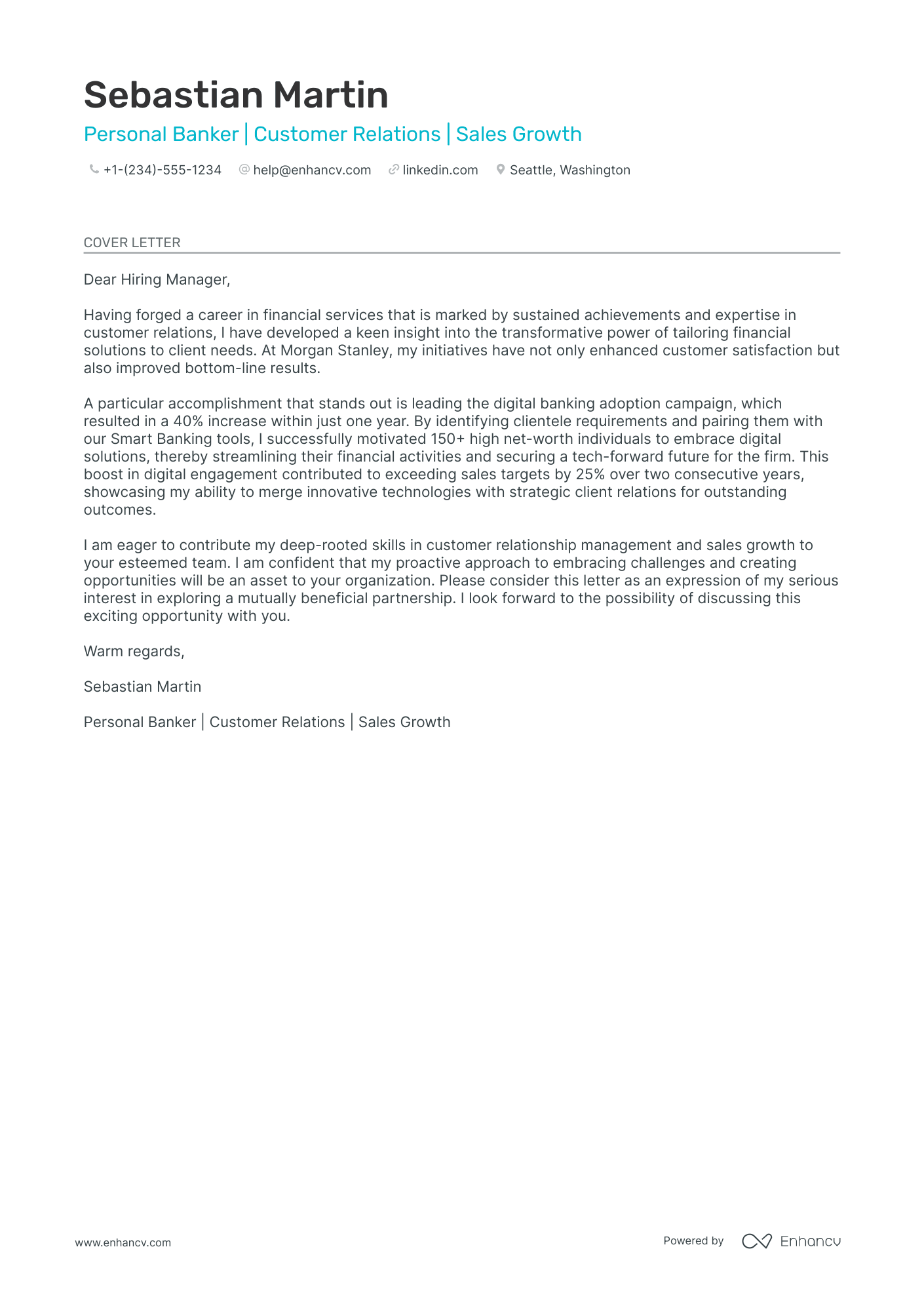Crafting a compelling bank manager cover letter can be a daunting task, especially when it's the final step blocking your path to a dream job. You've polished your resume, yet the cover letter is not just a regurgitation—it's your chance to share a gripping professional tale. Zero in on that one accomplishment you beam with pride over, narrate your triumph, and keep cliches at bay. Remember, formality matters, but so does brevity; your story on paper should unfold within a single page.
- Including all the must-have paragraphs in your structure for an excellent first impression;
- Learning how to write individual sections from industry-leading cover letter examples;
- Selecting the best accomplishment to tell an interesting and authority-building professional story;
- Introducing your profile with personality, while meeting industry standards.
And, if you want to save some time, drag and drop your bank manager resume into Enhancv's AI, which will assess your profile and write your job-winning cover letter for you.
If the bank manager isn't exactly the one you're looking for we have a plethora of cover letter examples for jobs like this one:
- Bank Manager resume guide and example
- Senior Accountant cover letter example
- Finance Associate cover letter example
- IT Auditor cover letter example
- Finance Executive cover letter example
- Accounts Payable Clerk cover letter example
- Financial Accounting cover letter example
- CPA cover letter example
- Staff Auditor cover letter example
- Cost Accounting cover letter example
- Accounts Clerk cover letter example
Drop your resume here or choose a file.
PDF & DOCX only. Max 2MB file size.
Bank manager cover letter example
Lucas Rodriguez
Columbus, Ohio
+1-(234)-555-1234
help@enhancv.com
- Quantifiable Achievements: The cover letter effectively showcases specific, measurable accomplishments such as surpassing sales goals by 25% and accelerating loan approval times by 35%, which highlights the candidate's ability to deliver results.
- Relevant Experience: Mentioning a reputable past employer like KeyBank along with the position of Branch Manager assures the hiring manager of the candidate's industry experience and leadership skills.
- Customer and Operational Focus: The writer emphasizes a balance between customer satisfaction and operational efficiency, aligning with the industry's priority of providing excellent service while maintaining rigorous compliance and procedural standards.
What are the basics of the design or format of your bank manager cover letter?
To start, here's a reminder for you: the Applicant Tracker System (or software that is used to assess candidate profiles), won't be reading your bank manager cover letter.
Recruiters enjoy reading bank manager cover letters with a standardized format that uses:
- the same font as the resume (e.g. modern ones like Raleway or Volkhov are prefered over the clichéd Times New Roman or Arial);
- single spacing to keep the content concise and organized (this is all ready for you in our cover letter templates);
- a one-inch margin to wrap around the text, like in our cover letter builder;
- PDF as a file format, as it allows your design (and visual element) to stay the same.
Finally, we can't go on without mentioning the key sections of your bank manager cover letter.
In the top one-third, make sure to include a header (with your contact information, name, role, and date), a salutation, and an introduction.
Next, follows the heart and soul of your bank manager cover letter or its body.
End your bank manager cover letter with a closing paragraph and, if you wish, a signature.
Need a cover letter, but short on time? Use our free cover letter generator to create one from your resume in no time.
The top sections on a bank manager cover letter
- Header: Includes your contact information, the date, and the employer's details, which is essential for the recruiter to quickly identify who you are and how to contact you.
- Opening Greeting: Addresses the hiring manager or recruitment team directly, showing your attention to detail and respect for formal business communication.
- Introduction: Briefly outlines your current role, your interest in the position, and a powerful statement about why you’re the right fit for the bank manager role, grabbing the recruiter’s attention.
- Professional Experience and Achievements: Delivers concise examples of your past leadership experiences, financial acumen, and successes in managing a banking team, directly aligning with the requirements of a bank manager.
- Closing and Call to Action: Expresses your enthusiasm for discussing how your skills and experiences align with the bank's goals and includes a polite request for an interview, signaling your proactive approach.
Key qualities recruiters search for in a candidate’s cover letter
Financial Acumen: Strong understanding of financial statements, banking regulations, and investment products to effectively manage bank operations and make informed decisions.
Leadership and Management Skills: Proven ability to lead, manage, and motivate a team of employees to maintain high levels of customer service and operational efficiency within the branch.
Risk Management Expertise: Experience in identifying, assessing, and mitigating financial risks to ensure the bank's assets and reputation are safeguarded.
Sales and Customer Service Orientation: A strong track record of developing strategies to increase the bank's customer base and foster deep relationships with clients to boost retention and satisfaction.
Strategic Planning Ability: Demonstrated experience in setting goals, creating plans, and implementing actions to achieve business growth and meet the bank's objectives.
Regulatory Compliance Knowledge: In-depth understanding of the legal and regulatory environment in which banks operate to ensure full compliance and avoid potential legal issues.
The bank manager cover letter salutation: how to address hiring managers
After covering the format of your bank manager cover letter, let's look at the salutation.
Back in the day, the cordial "To whom it may concern" or "Dear Sir/Madam", might have worked out fine.
But, nowadays, your cover letter should approach hiring managers on a more personal basis.
So, what to do about your cover letter salutation?
If you've messaged the recruiters and are on a first name basis or a more formal one, use the hiring manager's name in the greeting (e.g. "Dear Sophie," "Dear Ms. Givens", or "Dear Mr. Everett,").
Always aim to make the effort to find out the name of the hiring manager, who'd be assessing your application. Search on LinkedIn, double-check the advert on the corporate website, or message the brand on social media to find out more about the role.
If you can't find the hiring manager's name (and still want to sound professional), use "Dear HR Team,", "Dear Hiring Manager,", or the likes.
List of salutations you can use
- Dear Hiring Manager,
- Dear [Bank's Name] Team,
- Dear Mr./Ms. [Last Name],
- Esteemed Selection Committee,
- Respected Recruiter,
What to include in those first two sentences, or your bank manager cover letter introduction
Have you ever wondered what the best way is to present your profile in the bank manager cover letter introduction?
There's no right or wrong answer if you're being concise and authentic to yourself.
Some professionals start their bank manager cover letter by:
- congratulating the company - focusing on something impressive, whether that's an award, an industry-leading project, or a key event;
- aligning their passion for the field or industry with the job - if you're enthusiastic about what you do, you'd thus grow your skill set and value as a professional.
Storytelling in the middle (or body) of your bank manager cover letter
You've got your whole resume sorted, detailing your achievements and skills. What else can you write in your bank manager cover letter?
For starters, take the time to re-assess the job requirements and re-discover the most crucial skills and requirements (or keywords).
After making a list of these important keywords, look back on your experience to select just one of your past accomplishments.
Choose the achievement that is the most noteworthy, relevant to the role, and matches the required skills.
Use the next between three and six paragraphs to narrate how:
- you've grown your skill set, thanks to your achievement;
- you'd use the know-how you've gained in your new role;
- your accomplishment could help your potential employers grow.
Remember that recruiters don't need a retelling of your whole resume, but want to find out what makes you, you.
Time to wrap up your bank manager cover letter
Writing the closing paragraph of your bank manager cover letter is just as important as the salutation.
You have to make it personalized to the job advert and recruiter.
Experienced professionals advise candidates to end with a request or reminder for follow-up. Write that you're grateful for the opportunity, and, at the same time, hint that you're available for the next steps of the process.
Otherwise, you could also conclude your bank manager cover letter by facing the future. How do you see yourself, as part of the team? In particular, how would you settle in your new role in the first six months to a year?
Which story should you tell in your bank manager cover letter when you have zero experience
Candidates, lacking professional experience in the field - this one is for you.
Your bank manager cover letter is an exercise of integrity, honesty, and, above all, spinning a positive narrative around your strengths.
And what better way to capture recruiters' attention than with your most job-relevant achievement (this could be from your internship or volunteering experience)?
Make sure to back up your success with transferrable skills that are relevant to the job (e.g. how your year, studying abroad, has taught you to be more motivated and handle multicultural environments).
Another safe card you can bet on is your career dream: in the body of your bank manager cover letter, go into the details of how your ambitions would help make the company you're applying for better.
Key takeaways
Creating your bank manager cover letter should be a personalized experience for the role and the recruiter, where you:
- Format your cover letter using the same ATS-friendly font (e.g. Railway) as you did for your resume;
- Greet recruiters, using their name, and follow up with two sentences to introduce yourself, your interest in the role, and to stand out;
- Map out one key success from your career (or life) that has taught you job-crucial skills;
- Substitute your lack of experience with an achievement from your internships, degrees, or volunteering gigs;
- End with a promise for your potential or your availability for an interview.
Bank Manager cover letter examples
By Experience
Assistant Bank Manager
- Highlight Relevant Achievements: The letter effectively brings attention to specific achievements like exceeding sales goals by 20% and increasing customer satisfaction scores by 15%, demonstrating the candidate's direct contributions and success in the role.
- Alignment with Company Values: The introduction expresses admiration for the company’s focus on community engagement and exceptional customer service, setting a positive, customized tone and aligning personal values with the company's mission.
- Leadership and Team Motivation: The emphasis on leading a team and motivating them towards achieving common goals underscores the candidate’s leadership skills, which are critical for the role of Assistant Community Bank Manager.
- Focus on Customer Experience: The letter highlights the candidate’s commitment to improving customer experience, a vital aspect for roles in banking that revolve around customer satisfaction and retention.
By Role
Bank Branch Manager
Personal Banker
Bank Operations Manager
- Highlight Achievements: The cover letter effectively emphasizes specific achievements, such as leading initiatives that reduced costs by 15% and increased customer satisfaction by 20%, showcasing the candidate’s impact on the organization.
- Alignment with Organizational Goals: The letter clearly aligns the candidate’s past achievements and skills with the organization's focus on innovation and excellence, demonstrating an understanding of the company’s values and objectives.
- Industry-Specific Experience: By referencing experience at a reputable financial institution, the candidate highlights relevant industry expertise and ability to handle the specific challenges within the financial sector.
- Quantifiable Metrics: Using concrete numbers to describe accomplishments provides tangible evidence of success and effectiveness in operations management, strengthening the credibility of the candidate’s claims.
